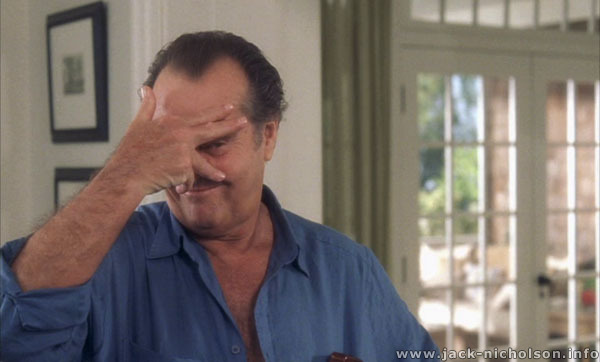“Something’s Gotta Give’s” characters develop feelings for each other over a bowl of pancake mix, and spend the rest of the film waxing philosophical over their feelings, what it meant, and how – or whether – they should proceed. For Erica (Diane Keaton), it is admittedly the first time she has been in love since her divorce. For 63-year-old Harry (Jack Nicholson), it may be the first time he has been in love ever, which might be either hopeful discovery or profound sadness. Keaton and Nicholson, who have been in countless Oscar nominated films, are at times constrained by the movie’s often-clichéd script, but somehow the film leaves a pleasing experience in its wake nonetheless.
As romantic comedies usually follow, a bizarre situation brings Erica and Harry together. While dating Erica’s daughter Marin (Amanda Peet), and staying at Erica’s house for the weekend, Harry suffers a heart attack and remains at Erica’s house with while he recuperates. A swinger with a taste for younger women, clear chance leads Erica and Harry to meet late one night in the kitchen for banter that leads to eventual feelings for each other. “Words have been invented to describe women like you,” Harry states in that droll, purposeful speak Nicholson is famous for. “Flinty. Impervious.” “I can’t decide if you hate me, or if you’re the only person who ever got me,” Erica says. “I don’t hate you,” Harry finishes.
As a ‘will-they-won’t they’ later-life romance between a famous playwright in Erica, and a wealthy music executive in Harry, it should come as no surprise that most of the film occurs in this manner, as pleasing and cutesy dialogue that often feels as if it is written and not spoken. However, in Nicholson and Keaton’s hands, less damage is done, and the material is used to point introspective fingers at humor, mothers and daughters, and, of course, love. Other plot wrinkles are sprinkled throughout “Something’s Gotta Give,” such as another possible love interest for Erica in the form of the very doctor that saved Harry’s life (played affably by Keanu Reeves), and subsequent, nubile young women Harry uses to attempt to slip back into his old life after he and Erica spend the night together.

One of the weaker plot mechanisms of romantic comedies these days seems to be the “love triangle,” whereby one or more parties is destined to be hurt by the movie’s end so the main characters can be together. I’ve complained about it before in movies like “Serendipity;” however, smart films find a way to use characters involved in the love triangle (or quadrangle, in this movie’s case) as fodder for commentary on life or love. “Something’s Gotta Give,” thankfully uses it for this purpose. Some scenes may rest precariously on the hackneyed side (such as Erica and Harry’s indecision to spend the night together), while others reach heights usually reserved for more serious dramas, such as a heart-to-heart Erica has with her daughter and the round-a-bout way that Harry comes to terms with his womanizing and attempts to make decisions for the future.
The acting in in the film is decent all around, led of course by Keaton and Nicholson. Keaton, who has surfaced quite a bit recently in films such as “Hanging Up,” and “The Other Sister” fills the shoes of Erica well, bringing emotion and humor to the role. Nicholson is pleasing as well, and seems to be channeling more fleshed out roles such as “Wolf” or “As Good As it Gets” in his portrayal of the womanizing Harry. There’s an honesty and vulnerability that both Keaton and Nicholson bring to their roles that is refreshing, and each has their take-a-way scenes. For Nicholson, it’s a speech before an old flame that brings closure and meaning to his wayward past; for Keaton, it’s a conversation with Marin about her ex-husband’s remarriage and the perils of guarding your heart.
 Criticism of the film, should it come, certainly belongs to its overlong run-time, clocking in at 128 minutes, a longevity which becomes apparent as the film dances around its conclusion, prolonging it as long as possible. Also, some predictable and irritating side-plots detract from the overall tone and quality of the film, and could have probably been edited out with no tremendous loss to the film at all. The worst offender here is the character of the doctor Julian played by Keanu Reeves, included for little more than dramatic twist. However, the failure should be attributed solely to Julian’s inclusion, and not from a failure in Reeves’ acting. There is a scene toward the film’s conclusion where Reeves delivers, with just a look, the kind of powerful acting often reserved for better films. Julian’s a throw-a-way character; but for just a second, Reeves makes us remember him.
Criticism of the film, should it come, certainly belongs to its overlong run-time, clocking in at 128 minutes, a longevity which becomes apparent as the film dances around its conclusion, prolonging it as long as possible. Also, some predictable and irritating side-plots detract from the overall tone and quality of the film, and could have probably been edited out with no tremendous loss to the film at all. The worst offender here is the character of the doctor Julian played by Keanu Reeves, included for little more than dramatic twist. However, the failure should be attributed solely to Julian’s inclusion, and not from a failure in Reeves’ acting. There is a scene toward the film’s conclusion where Reeves delivers, with just a look, the kind of powerful acting often reserved for better films. Julian’s a throw-a-way character; but for just a second, Reeves makes us remember him.
“Something’s Gotta Give” is standard romantic fare, but at times manages to test the limits of the genre with heart, dialogue, and character development it’s not used to seeing. Both Nicholson and Keaton give confident and humorous performances, while still letting us know that they’re human along the way. The film has some interesting locations for its happenings, fluctuating between the idyllic Hamptons, to the busyness of Manhattan, to the romantic longings of Paris. It’s not the circumstances, but the ups and downs of love that people go to romantic comedies to see. “Something’s Gotta Give” finds a baldly ridiculous circumstance to place its characters in; however, the ups and downs are there, leading the film to make an effort at a real statement. You’ve got to give it credit for that.
– by Mark Ziobro


